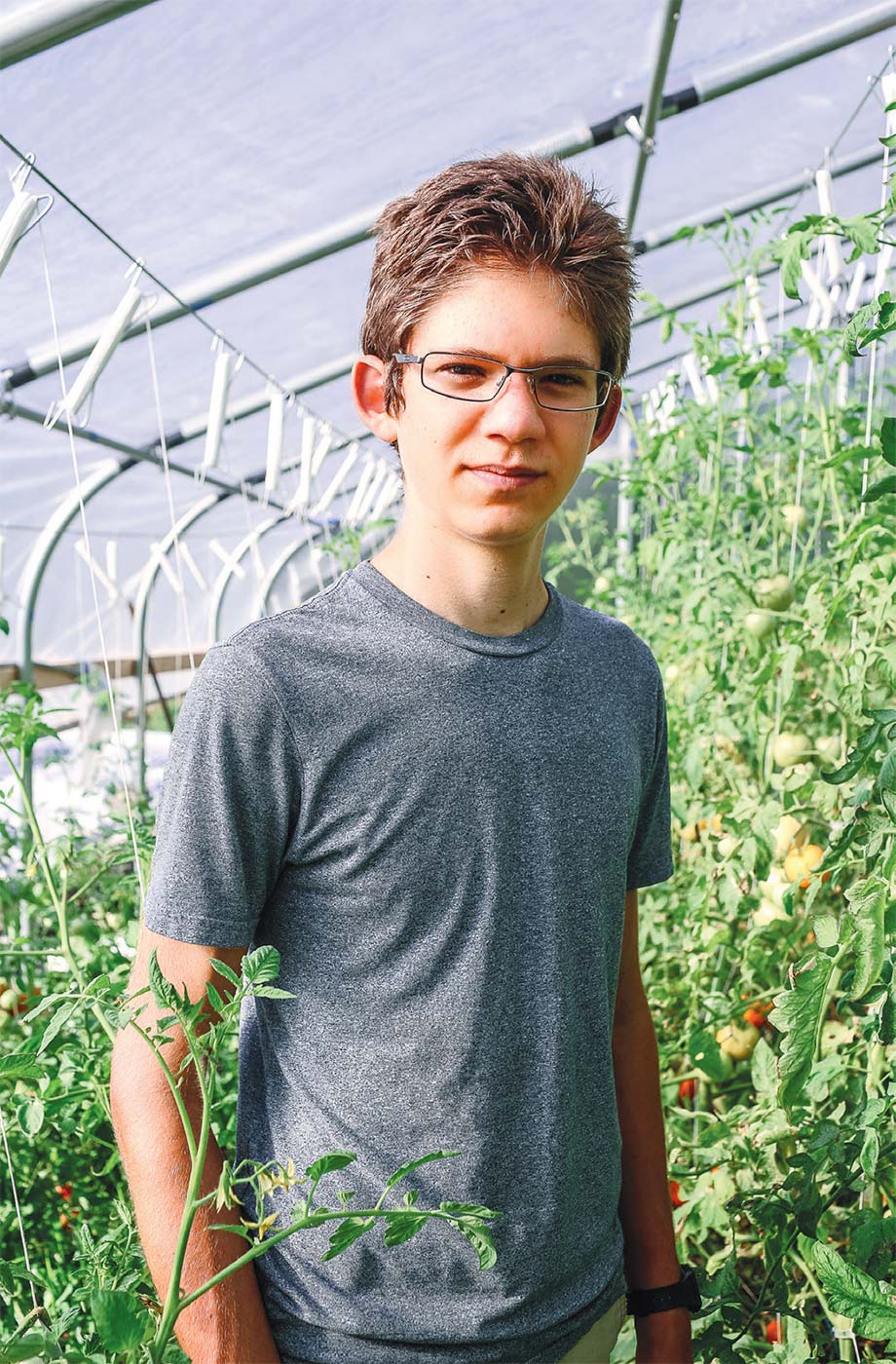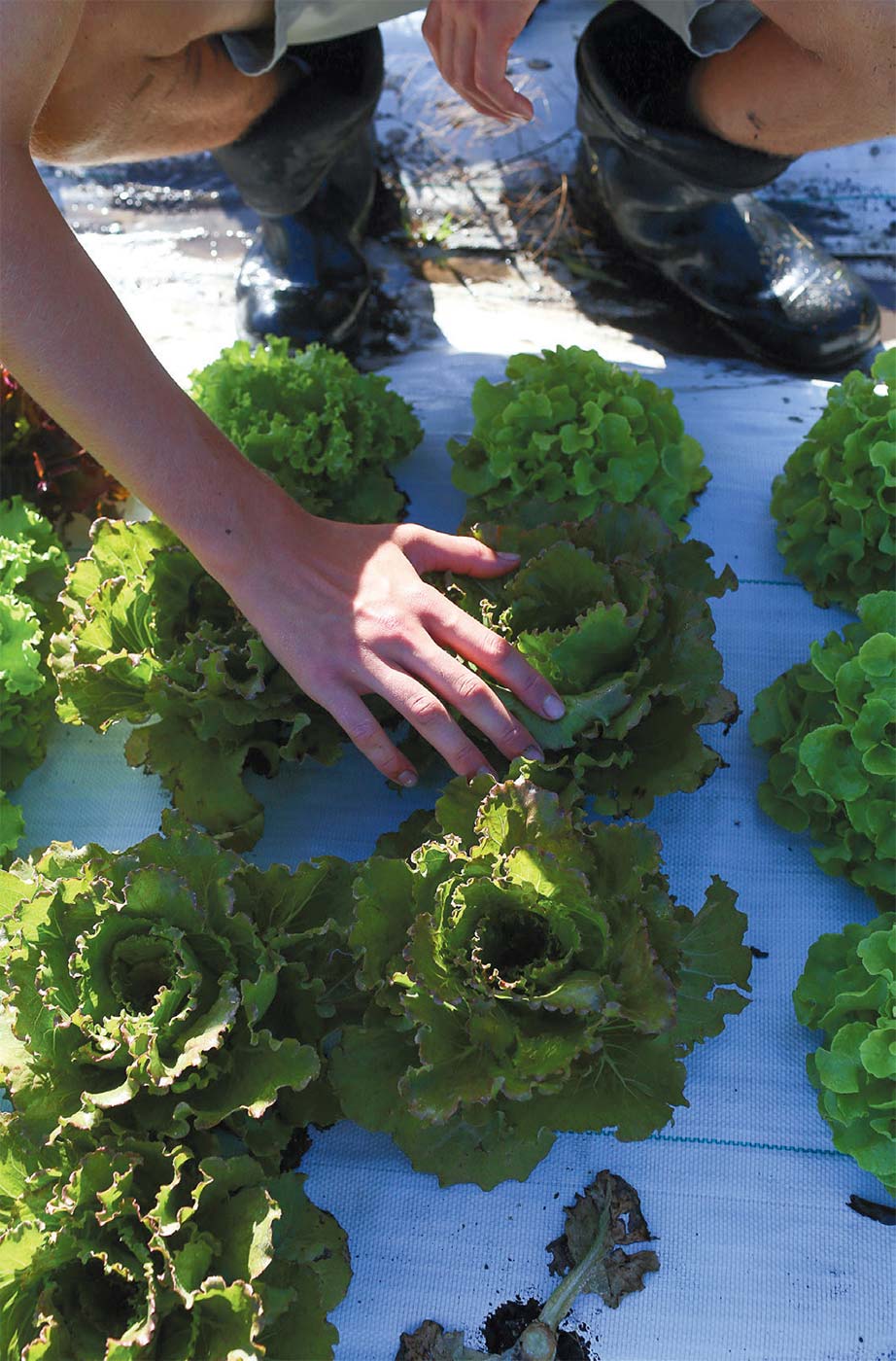- a
 Fifteen-year-old Dawson Mehalko brings singular focus to his Trenton farming plot
Fifteen-year-old Dawson Mehalko brings singular focus to his Trenton farming plot
A FRESH TAKE ON TEEN SPIRIT
STORY KIM PIERCE PHOTOS MELINDA ORTLEY
Wearing black rubber boots against the sticky gumbo mud, Dawson Mehalko is the farmer-gardener in charge of Jubilant Fields Farms—outside Trenton north of McKinney—from its neatly planted rows of baby lettuces and broccolini to its trellised tomatoes winding high inside the 1,000-square-foot greenhouse.
He’s excited about a new kind of potato he’s testing on one plot, and inside his diminutive “nursery” greenhouse, he’s growing onion microgreens experimentally for Homewood chef-owner Matt McCallister in Dallas. Dawson has a steady customer in chef/co-owner Robert Lyford at Patina Green Home and Market in McKinney. He also sells at the Van Alstyne Farmers Market and has a salad subscription program.
He speaks earnestly and knowledgeably about no-till farming: “Compost is the backbone of my farm.” He prefers the farming method because he believes it produces the highest-quality product. And reckons that he spends forty to fifty hours a week working his 1/5-acre field.
“It’s more than a full-time job,” he says. It’s his passion.
Did I mention that Dawson Mehalko is 15 years old?
“I’m a pure-bred entrepreneur,” he says matter-of-factly, as we survey his leafy domain. “I was selling pencils for a dollar apiece when I was 4 years old.”
That doesn’t surprise Lyford, who met Dawson last year. The chef uses a lot of local, small-farm produce for his famous sandwiches at Patina Green, often labeling them with the producers’ names, such as “Marla’s tomatoes” (from Marla Baugh of Baugh Farms in Wills Point) or “Carter’s eggs” (from Cartermere Farms in Celina). “Dawson’s radishes.”
Dawson made a cold call at Patina Green in spring 2018.
“He came in here with three boxes of produce,” Lyford recalls. “Asked to speak to me.
“He says, ‘My name’s Dawson. I specialize in baby vegetables—lettuces, microgreens, French breakfast radishes….’ They were the most beautiful radishes I’d seen. I told him I was interested in the radishes. Told him I couldn’t buy the lettuces and microgreens.”
Lyford explained to the young man that he was already sourcing those from Profound Microfarms in Lucas.
The chef was impressed with how the then-13-year-old processed the answer. He said, ‘Sure, that makes total sense.’”
Lyford wound up buying the radishes and all three boxes anyway. He liked Dawson’s persistence. “He was really good about staying in contact, staying in front of me,” Lyford says. But when the season was tailing off late last summer, the radishes began to grow too spicy. “I didn’t want to squash the kid, but I told him, ‘These radishes suck.’”
Dawson recalls that Lyford wasn’t quite that blunt. “He said ‘I don’t want these anymore.’”
“I saw the wheels turning,” Lyford says, as he worked to find the balance between encouragement and bluntness. “Then he (Dawson) says, ‘That’s fine. It’s just about taking notes and making adjustments for next season.’ He said that, and I said [to myself] ‘This kid’s special.’”
“It’s more than a full-time job,” Dawson says. It’s his passion.
Dawson was not deterred. The young, home-schooled farmer is already planning—and planting—his winter salad crops and winter greenhouse tomatoes. He’s still harvesting baby leeks he grew for chef-owner Misti Norris at Dallas’ Petra and the Beast. He’s aiming to expand his operation to a quarter acre by next spring. As we walk his beds, he notes that one of the lettuces that promised to be heat-tolerant isn’t. He’s letting it go to seed to feed the “beneficials” —insects, that is. He shows me where he’s testing to see which cover crops work best.
“I like solving the problems,” he says simply when asked why he farms with such fervor. And he’s the only one of his four brothers and sister who has this particular bent. His father Eric Mehalko got him started in gardening, he says, and helped him build his greenhouse. But watching small-farm guru Curtis Stone was Dawson’s aha! moment. On Stone’s YouTube Urban Farmer channel, he showed how to make $100,000 a year on a quarter-acre farm.
Dawson doesn’t expect to reap such a bounty. Rather, he’s excited that farming on a small plot can be reasonably profitable; there’s a path to making a good living doing what he loves. But is farming something he wants to pursue the rest of his life?
“I can only harvest so many thousands of bunches of radishes until I don’t get stoked harvesting thousands of bunches of radishes,” he says. “I’m 15. I’ll probably live until I’m a hundred. I don’t know if I want to do this for 85 years. I do know I’m going to work in ag.”
Instagram: Jubilantfieldsfarms

KIM PIERCE is a Dallas freelance writer and editor who’s covered farmers markets and the locavore scene for some 30 years, including continuing coverage at The Dallas Morning News. She came by this passion writing about food, health, nutrition and wine. She and her partner nurture a backyard garden (no chickens – yet) and support local producers and those who grow foods sustainably. Back in the day, she co-authored The Phytopia Cookbook and more recently helped a team of writers win a 2014 International Association of Culinary Professionals Cookbook Award for The Oxford Encyclopedia for Food and Drink in America.
- Kim Piercehttps://www.edibledfw.com/author/kpierce/
- Kim Piercehttps://www.edibledfw.com/author/kpierce/
- Kim Piercehttps://www.edibledfw.com/author/kpierce/
- Kim Piercehttps://www.edibledfw.com/author/kpierce/









